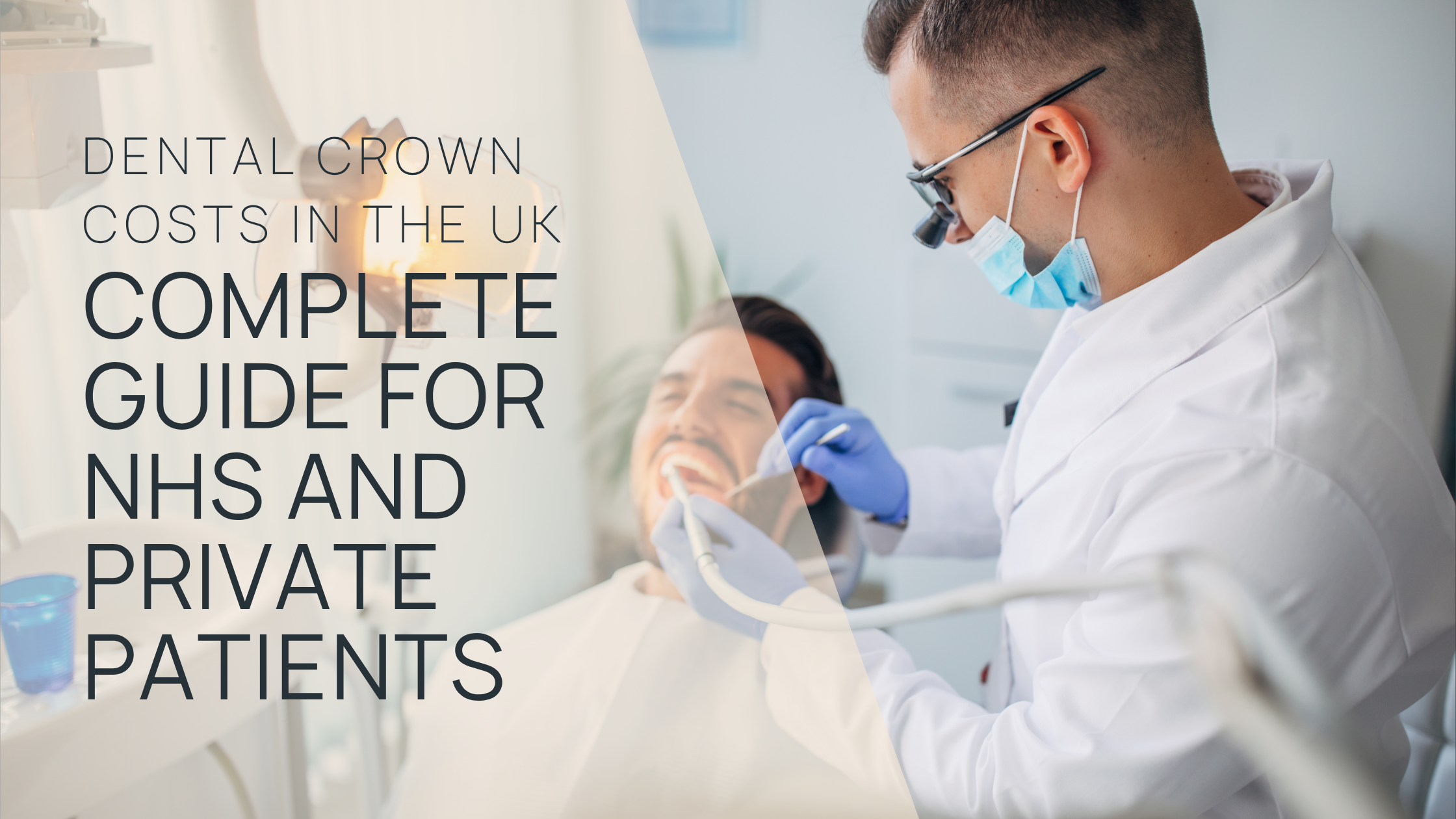Dental Crown Cost in the UK: 2025 Guide for NHS and Private Patients
Dental Crown Cost in the UK: 2025 Guide for NHS and Private Patients
A dental crown restores strength, function, and appearance when a tooth is badly damaged, fractured, discoloured, or weakened after root canal therapy. In 2025, many UK patients are weighing up their options between NHS treatment and private clinics. Understanding the dental crown cost in the UK helps you make an informed choice about your health, budget, and long-term smile.
NHS Dental Crown Cost in the UK in 2025
In England, crowns fall under Band 3 NHS treatment. From April 2025, the fixed Band 3 fee is £326.70 for the entire course of treatment. This covers the consultation, preparation, fitting, and the crown itself. Whether you need a crown for a molar or a front tooth, the fee remains the same.
2024 Band 3 fee: £319.10
2025 Band 3 fee: £326.70 (as set by the NHS Business Services Authority)
Key points about NHS crowns:
The material is chosen by clinical need, not aesthetics.
Crowns are covered by a 12-month guarantee. If repair or replacement is needed within a year, you are not charged again.
Exemptions apply for under-18s, full-time students under 19, pregnant patients, new mothers (within 12 months), and those eligible through the Low Income Scheme.
Note: Scotland, Wales, and Northern Ireland have different NHS pricing systems. This guide focuses on England.
Private Dental Crown Cost in the UK
Private fees vary widely depending on material, clinic location, laboratory costs, and complexity. Below are typical price ranges in 2025:
| Location | PFM Crown | Zirconia Crown | E-max Crown | Single Crown (range) |
|---|---|---|---|---|
| Hertfordshire | £800 | £1,200 | £1,200 | £850–£1,250 |
| Liverpool (Garston) | £695 | £800 | £800 | £755–£860 |
| Liverpool (City Centre) | £850 | £900 | £900 | £940–£990 |
| London (Marylebone) | £1,200 | £1,500 | £1,500 | £1,455–£1,875 |
| Brighton | £495 | £495 | £495 | £540 |
| London (Putney) | £991 | £1,339 | £1,339 | £1,093–£1,441 |
Why prices vary
Material: Porcelain-fused-to-metal (PFM), zirconia, and lithium disilicate (E-max) each differ in cost and aesthetics.
Lab work: Hand-layered ceramics or high-end zirconia increase price.
Location: Central London is consistently more expensive than regional practices.
Case complexity: Crowns requiring posts, core build-ups, or occlusal rehabilitation are priced higher.
Workflow: Same-day CAD/CAM crowns may cost more for convenience.
NHS vs Private Crowns: What’s the Difference?
| Feature | NHS Crown | Private Crown |
|---|---|---|
| Price | £326.70 (England, 2025) | £700–£1,500+ |
| Materials | Chosen for function | Full choice, including premium ceramics |
| Aesthetics | Adequate, not customised | Shade-matched, natural translucency |
| Waiting Time | Weeks, depending on access | Faster, often same-day |
| Provider Choice | Limited | Choose your dentist or hospital |
NHS crowns focus on function and predictable outcomes. Private crowns prioritise choice, aesthetics, and speed.
Which Crown Material Is Right for You?
Back molars with strong bite forces: Monolithic zirconia or PFM crowns provide strength and durability.
Front teeth with high aesthetic demand: E-max or layered ceramics give natural translucency and lifelike appearance.
Fast treatment: CAD/CAM crowns made from zirconia or lithium disilicate can often be fitted on the same day.
Evidence shows:
Zirconia crowns have ~98% survival at 5 years.
Lithium disilicate crowns have >95% survival at 5–8 years.
All-ceramic crowns perform comparably to metal-ceramic in long-term studies.
What Drives Longevity and Value?
Quality of fit and preparation
Bite forces (e.g., grinding or clenching)
Bonding method (adhesive vs conventional cement)
Oral hygiene and maintenance
Night guard use in bruxism cases
Advanced Technology at Hospital One
At Hospital One, we combine European standards with digital precision:
Intraoral scanning and low-dose CBCT for accurate planning
CAD/CAM milling for crowns, including same-day zirconia and E-max
ISO 6872-compliant ceramics with full CE-marked traceability
EU-aligned sterilisation and safety protocols
Benefits for patients:
Fewer visits with same-day crowns when suitable
High marginal accuracy for long-lasting results
Natural aesthetics with customised shading
Documented traceability for every material used
Patient Testimonials
“If I’d known I could come abroad and get everything fixed for this price, I’d have done it years ago.”
– UK Patient, Full-Mouth Rehabilitation
“They explained everything clearly and gave me real solutions. I felt completely safe.”
– European Patient
NHS or Private: How to Decide
Choose NHS when:
Function is the main priority
You qualify for exemptions
Waiting times are acceptable
Choose Private when:
You want specific materials or high-end aesthetics
You prefer faster timelines or same-day options
You need complex cosmetic or bite rehabilitation
Treatment Abroad: An Option for Some Patients
A growing number of patients are exploring treatment overseas, including in Albania, where modern hospitals like Hospital One offer EU-standard care with internationally trained dentists. The advantages include:
Competitive pricing compared with UK private fees
Access to advanced digital dentistry
Transparent protocols, CE-marked materials, and aftercare
Safety is key: Albania is aligned with EU regulations, with strict sterilisation, ISO standards, and CE-marked devices.
The dental crown cost in the UK depends on whether you choose NHS or private care, the material selected, and the level of aesthetics you want. NHS crowns remain accessible at a fixed fee of £326.70 in 2025, while private crowns range from £700–£1,500+. For patients considering faster treatment, digital workflows, or international options, modern hospitals like Hospital One provide world-class results with full European safety compliance.
FAQs
-
NHS crowns cost £306.80. Private crowns range from £500 to £1,500, depending on material and clinic.
-
Private Dental Crown Cost in the UK vary due to material, lab fees, clinic location, case complexity, and workflow.
-
Metal-ceramic is a benchmark. Zirconia and E-max show excellent survival rates.
-
Yes, 12 months for repair or replacement.
-
Yes, clinical studies show comparable fit and outcomes when properly indicated.

